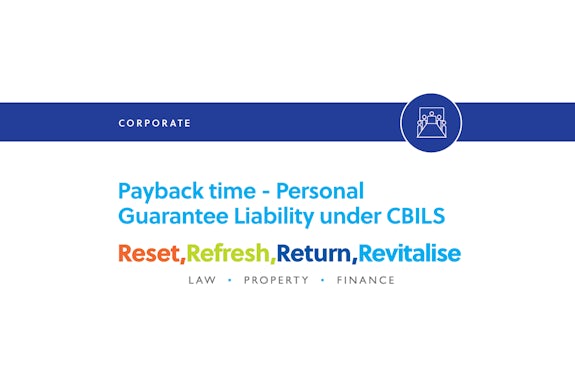
By David Winnie
May 20, 2025

As we know, CBILS gives the lender a government-backed guarantee for the loan repayments, the purpose being to encourage lending to support business in these financially challenging times. The Government guarantee extends to 80% of outstanding amount due under the CBIL loan.
Under the scheme, personal guarantees of any form are not taken for facilities below £250,000. For facilities above £250,000, personal guarantees may be required, at a lender’s discretion. However, at all times the borrower remains fully liable for the debt.
When though can the lender call upon the personal guarantee?
If a personal guarantee is used, the following rules apply:
So by way of example, if the CBILS loan is £2,000,000 and the borrower pays off £800, 000 but then defaults there shall be £1,200,000 due to the lender. The lender then needs to recover the balance from all other sources that are available to it. If following that the lender recovers £200,000 there shall still be £1,000,000 still outstanding. The lender can then call upon the personal guarantee. As the personal guarantee is limited to 20% of the outstanding amount the lender can recover £200,000 from the guarantor. The loss to the lender shall therefore be £800,000. At that point the lender can then call on the Government to pay to the lender 80% of the loss (i.e. £640,000), resulting in a total loss to the lender of £160,000.
It will also be interesting to see how and when many lenders pursue recovery for CBILS loans and claims under personal guarantees as we come out of the lockdown. Many business owners will have taken out a CBIL in good faith hoping that a lifting of the lockdown will trigger a return to normal trading conditions. Lenders will also be concerned about reputational issues and won’t want to be perceived to be taking enforcement actions prematurely.
Where your clients have taken out a CBILS and, in particular, where directors/owners have given personal guarantees, and there is any question about the borrower being able to repay the loan, the taking professional advice is essential.
If you would like further information on the topic discussed in this article, please contact Craig Darling by email: cdarling@gilsongray.co.uk or by phone: 0141 530 2044 / 07841 920 467 . You can also view Craig’s profile by clicking here.
The information and opinions contained in this blog are for information only. They are not intended to constitute advice and should not be relied upon or considered as a replacement for advice. Before acting on any of the information contained in this blog, please seek specific advice from Gilson Gray.

Craig has more than 20 years’ experience in all aspects of corporate, banking, restructuring and insolvency law